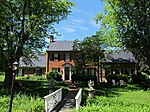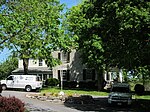The Third Battle of Winchester, also known as the Battle of Opequon or Battle of Opequon Creek, was an American Civil War battle fought near Winchester, Virginia, on September 19, 1864. Union Army Major General Philip Sheridan defeated Confederate Army Lieutenant General Jubal Early in one of the largest, bloodiest, and most important battles in the Shenandoah Valley. Among the 5,000 Union casualties were one general killed and three wounded. The casualty rate for the Confederates was high: about 4,000 of 15,500. Two Confederate generals were killed and four were wounded. Participants in the battle included two future presidents of the United States, two future governors of Virginia, a former vice president of the United States, and a colonel whose grandson, George S. Patton became a famous general in World War II.
After learning that a large Confederate force loaned to Early left the area, Sheridan attacked Confederate positions along Opequon Creek near Winchester, Virginia. Sheridan used one cavalry division and two infantry corps to attack from the east, and two divisions of cavalry to attack from the north. A third infantry corps, led by Brigadier General George Crook, was held in reserve. After difficult fighting where Early made good use of the region's terrain on the east side of Winchester, Crook attacked Early's left flank with his infantry. This, in combination with the success of Union cavalry north of town, drove the Confederates back toward Winchester. A final attack by Union infantry and cavalry from the north and east caused the Confederates to retreat south through the streets of Winchester.
Sustaining significant casualties and substantially outnumbered, Early retreated south on the Valley Pike to a more defendable position at Fisher's Hill. Sheridan considered Fisher's Hill to be a continuation of the September 19 battle, and followed Early up the pike where he defeated Early again. Both battles are part of Sheridan's Shenandoah Valley campaign that occurred in 1864 from August through October. After Sheridan's successes at Winchester and Fisher's Hill, Early's Army of the Valley suffered more defeats and was eliminated from the war in the Battle of Waynesboro, Virginia, on March 2, 1865.





